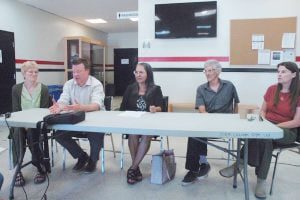Drought level currently at most extreme.
By Robert Barron, Cowichan Valley Citizen, Aug 3, 2023

The Cowichan Watershed Board held a news conference on July 31 about the worsening drought in the region. From left are board members Alison Nicholson, co-chair Aaron Stone, co-chair Lydia Hwitsum, David Slade and Dr. Shannon Waters. (Robert Barron/Citizen)
Facing what may be an unprecedented drought this summer as the hot and dry conditions continue in the region, the Cowichan Watershed Board said all stakeholders must come together to deal with the growing crisis.
In a news conference to address the issue on July 31, board co-chair and chief of Cowichan Tribes Lydia Hwitsum said the watersheds of the Cowichan River and Koksilah River are quickly approaching a critical situation due to low water levels which could have severe impacts on those that rely on them for water, as well as the rivers’ fish stocks.
Currently, the Cowichan Valley is at Drought Level 5, the most extreme, and the region is operating under Stage 3 water restrictions as warm and dry conditions continue with no end in sight.
Hwitsum said one solution that would help deal with the problem is the replacement of the weir on Cowichan Lake so more water can be retained in the lake during the wet season that could be released during droughts and raise the water levels in the two rivers and their watersheds.
Hwitsum said the federal government has already committed $24 million towards the replacement of the weir, but $14 million more is required, and the watershed board has been urging both senior levels of government and other agencies and organizations to come up with the remaining funding so the replacement project can begin as soon as possible.
“That $14 million is what we need right now, but the costs keep going up every day that we don’t move forward, so we could need a lot more money if we continue to wait,” she said.
The Cowichan Watershed Board is a partnership between Cowichan Tribes and the Cowichan Valley Regional District with a mandate to provide leadership for sustainable water management and to protect and enhance environmental quality and the quality of life in the Cowichan and Koksilah watersheds and adjoining areas.
Co-chair Aaron Stone, who is is also the chair of the CVRD, said the watershed board does have a collaborative relationship with both senior levels of government, and all agree that the replacement of the weir is becoming increasingly necessary with climate change and more extreme droughts every summer.
 Email
Email



